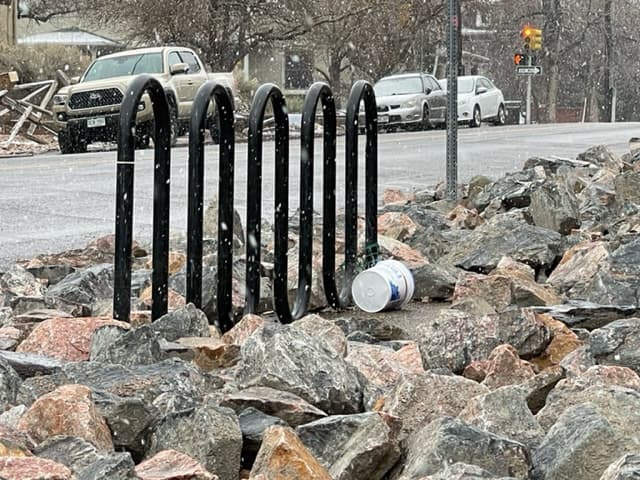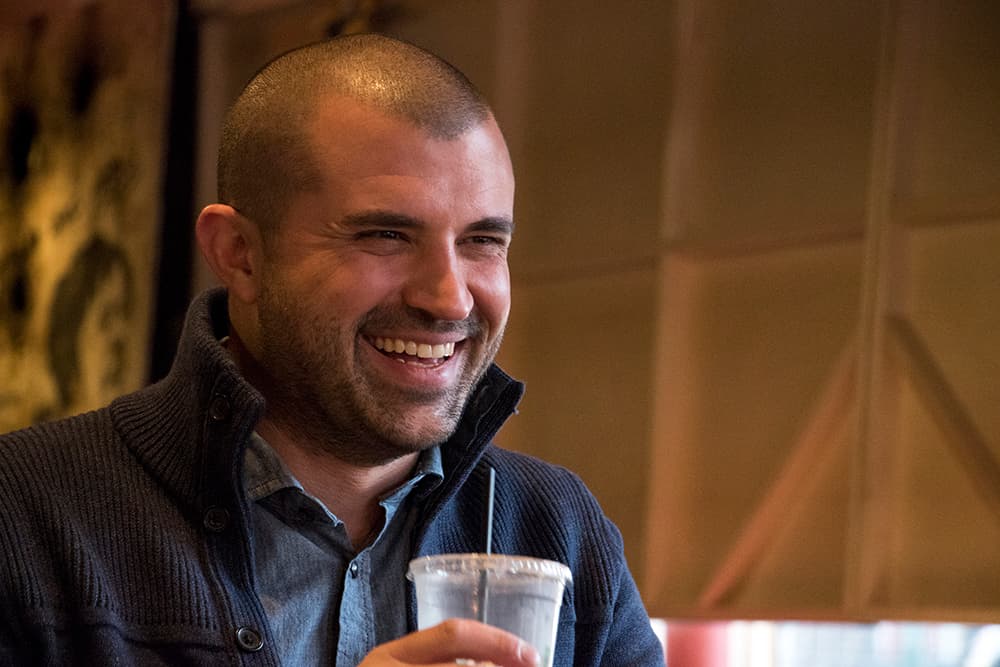A few weeks back, Kayvan Khalatbari was tagged on a Facebook post about jagged rocks placed in front of the Capitol Hill restaurant, Sexy Pizza, which he co-founded in 2008.
"'How dare Sexy Pizza put these rocks up," Khalatbari recalled reading. "'This is not a solution, yada, yada.'"
Friends tagged Khalatbari on the post. They wondered why this longstanding supporter of unhoused Denverites and groups like Denver Homeless Out Loud would install hostile landscaping designed to prevent unhoused people from camping around 11th Ave. and Ogden St.
His answer: "This is definitely not Sexy Pizza's doing. We would never do this."
The rocks, which Denverite wrote about last week, blocked a bike rack and irked unhoused people, cyclists and neighbors. The landscaping is part of a larger trend in Capitol Hill's landscaping in which public right of ways, cared for by property owners, have been blocked with fencing and rocks to prevent people from camping on the grass.
Khalatbari was uncertain who installed the rocks. His landlord, Katherine Diane MacRossie, did not return Denverite's email and phone messages about the new landscaping.

Khalatbari has been a champion of unhoused Denverites and an opponent of the camping ban, and not just out of some ideological commitment. He experienced homelessness himself.
"When we started Sexy Pizza back in 2008, I had never run a restaurant, had never owned a business," he recalled. "I exhausted every penny I had. I liquidated all my retirement accounts. I maxed out my credit cards. I borrowed money from family and friends to buy this pizzeria and then to operate at a loss for many months."
Three months after opening, he was working at the restaurant every day and not being paid, he remembered. He was three mortgage payments behind, and the bank started foreclosure proceedings. To save his home, he moved out and rented out all three bedrooms in the house to make his payments.
"I was living in a tent in various places around town," he said. "I slept in my truck a lot and just slept on friends' floors throughout Capitol Hill for about nine months. Most of the first year of Sexy Pizza, I was effectively homeless. Even though I had a house, I couldn't afford it."
Eventually, he caught up on his mortgage payments and was able to move back into his house.
"But it took me about a year," he said. "And I had that kind of rough nine months bouncing around to wherever I could find a safe spot to land."
In the years since, Sexy Pizza has become a worker-owned store and expanded to Park Hill and Trinidad. Khalatbari spent many years in the cannabis industry before leaving it. He has been an outspoken advocate for unhoused people and even briefly ran for mayor.
A few years back, at the urging of Denver Homeless Out Loud, Khalatbari installed lockers outside his restaurant so that unhoused people had a safe place to store their belongings when they went to work.
"A lot of people living on the street have jobs," he said. "And for them to have to haul their survival gear around all the time with them, especially into their job, is demoralizing, and doesn't give anybody a good feeling.

"So to give them a place to securely store their belongings when they're at work, or when they're getting services or when they're just out with friends -- we've always found that to be very important, with the city doing so very, very little to address the most basic needs of people experiencing homelessness: storage, public restrooms, sanitation, things like that," he added. "I think it's incumbent on private business owners to play a part in finding solutions."
Unfortunately, for Khalatbari, the city made him apply for a permit to keep the lockers up. That required his landlord's permission, and she denied it and asked him to remove the lockers immediately.
These days, Khalatbari is disillusioned by Denver's cultural and political life. In recent years, he's moved his efforts to Southern Colorado and Northern New Mexico. He's been a force in attracting Denver businesses like the hi-dive and Mutiny Cafe to Trinidad and is revitalizing an old theater in Raton, New Mexico.
Khalatbari continues to frown on Denver criminalizing homelessness and its sweeps of encampments.
"This move-along-to-where approach is just not healthy," he said. "It doesn't work for anybody. It becomes someone else's issue. It pushes these people that are just looking for a safe place to be into the recesses that are unsafe."
The rocks are not just bad for people experiencing homelessness, he said. The landscaping is also bad for business. Bikers struggle to lock up to the rock-blocked racks, and customers have a harder time getting out of their cars without tripping.
Most critically, for Sexy Pizza's operations, the spot where the rocks are is where delivery drivers have historically parked.
"On really busy Friday and Saturday nights," he said, "our drivers are now having to block alleys or block roads to come in and grab pizza."
Sexy Pizza's lease does not include parking spots, and the rocks feel like an affront to both Khalatbari's ethics and the restaurant's basic functions.
"It's kind of a double slap in the face on that front, in that it goes against everything that we believe in, and people are now associating this terrible practice of placing rocks in front of the store -- they're associating that with us," he said. "And it's made it harder on our drivers to do their job, especially on busy weekend nights."














